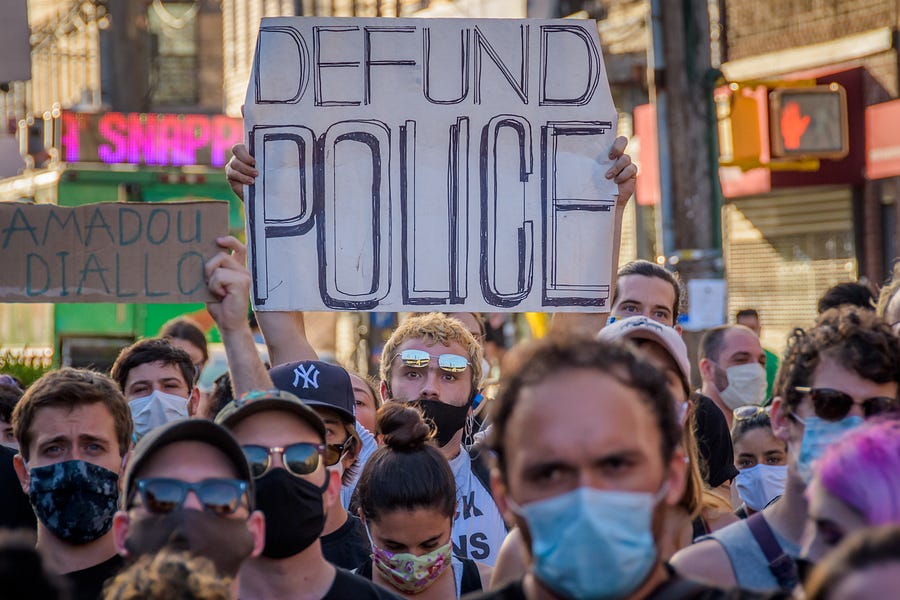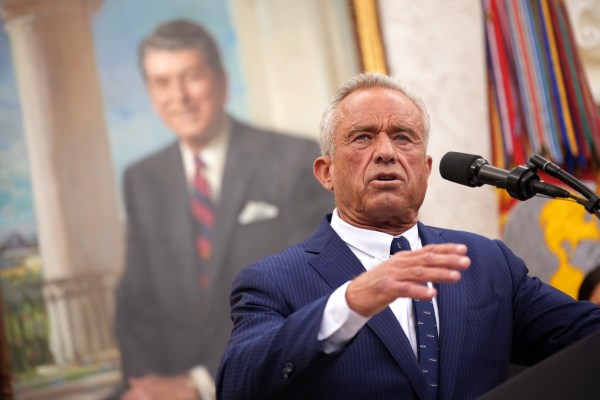In the wake of the widespread protests galvanized by George Floyd’s death, the idea of “defunding” the police, a fringe proposal consigned to university campuses and left-wing activist groups as recently as a few weeks ago, is now being debated seriously by politicians, media commentators, and organizers across the country. Most Americans are skeptical of the policy; but its presence has become an increasingly influential feature of our political discourse.
In material terms, however, it remains to be seen what “defunding”—often used interchangeably with “dismantling” or even “abolishing”—actually means. Mainstream progressives have been quick to explain that the movement is merely an attempt to “reimagine” the role of police in American society, paired with a prudent reallocation of some of the tax dollars being spent on law enforcement. But this line of argument is made more difficult by the movement’s more radical advocates, who insist that the phrase should be interpreted literally. As a recent New York Times headline reads: “Yes, We Literally Mean Abolish the Police.”
Two newly prominent organizations, #8Can’tWait and #8toAbolition, highlight this divide. The former takes a more gradual approach to defunding, seeing abolition as a long-term goal to be reached through important intermediate steps; the latter argues that the gradualist approach is “dangerous and irresponsible, offering a slate of reforms that have already been tried and failed [and] that mislead a public newly invigorated to the possibilities of police and prison abolition.”
Despite those disagreements, almost all of the movement’s adherents share the same end goal of a future in which the number of armed police is drastically reduced, and are largely informed by the same theories and academic framework that originally birthed the idea of police abolitionism. The roots of the push to defund the police lie in a set of ideas that have been popular in some segments of American society for decades.
One of those roots is a fundamental pessimism about the possibility of successful police reform. “I don’t think it’s possible to reform something that’s never functioned properly in the first place,” says Michael Sawyer, a Race, Ethnicity and Migration Studies professor at Colorado College. “You can’t point to a time in this country when police departments functioned properly. So reform doesn’t make sense if something isn’t formed in the first place.” As a result, advocates argue that law enforcement must be “redefined in a way where there is no role for publicly funded police departments, as they exist now,” says Sawyer. The most “conservative” iteration of this, he says, involves defunding some sectors of police work so as to “dismantle the notion that every problem with public safety means that someone has to show up with guns to take care of it.” The more radical version requires that we “completely dismantle police departments on a national basis, disallow anyone who’s been a police officer before from becoming a police officer again, and start all over with some kind of new model.”
These initiatives originated in academia, and can be traced back to the early 1900s. (Sawyer points to W.E.B. Du Bois’ 1935 Black Reconstruction and Walter Benjamin’s 1921 Critique of Violence as two foundational texts for what would later become abolitionist theory.) But a fully formed framework for abolitionism didn’t emerge until it was taken up by radical critical theorists and black feminist thinkers in the latter half of the 20th century, with widely read contemporary academics like Amna Akbar, Alex Vitale, and Ruth Wilson Gilmore explicitly pushing for the defunding and dismantling of the American criminal justice system in its totality.
In essence, abolitionist theory goes like this: Our policing and incarceral infrastructure—what communist-revolutionary-turned-U.C,-Davis-professor Angela Davis dubbed the “prison-industrial complex”—makes up a complex system of social control and domination and is therefore both unnecessary and actively oppressive. The contemporary idea began with the Black Panther Party’s push to replace state-operated police with a community-based enforcement model in the late 1960s and early 1970s. It was then further radicalized in the 1990s with the introduction of influential thinkers like Davis and Gilmore, who argued that the idea of policing itself was socially constructed and oppressive, therefore beginning a process that culminated in the contemporary push to defund police and close prisons.
But while many voters have moved in favor of moderate policing reforms in recent years, advocates of a defunded and dismantled police force have yet to adequately address many of the fundamental objections to their considerably more radical policy agenda.
The move to defund the police is built on the view that crime could be significantly reduced if money currently spent on law enforcement was spent on social services, mental health counseling, and other community-based nonviolent initiatives. “The solution is better jobs, better education, better drug treatment programs,” says Peter Enns, a professor of government at Cornell who specializes in criminal justice. “There needs to be a lot more spending and investment in social programs, public services and opportunities, and a lot less investment in the act of policing.”
In the abstract, this proposition sounds entirely reasonable. But some proponents of defunded law enforcement go a step further, arguing that crime could be entirely eradicated—thus making armed police obsolete—if the social conditions that give rise to crime were transformed. “I don’t think arguments about the human condition that say people are always going to want to kill others are necessarily true,” says Sawyer. “If you erect a social safety net that doesn’t throw people out of the system but instead pulls them closer, then you begin to eradicate crime. So that’s kind of the principle behind it. It’s a radically revised way to look at humanity.”
The push for police dismantlement can be traced back to this view: Abolitionists maintain that crime is the result of social conditioning rather than a permanently flawed human nature, in contrast to the more traditionally conservative notion of violence as an inescapable aspect of an intrinsically broken human condition.
This Rousseauian conceptualization of humanity as infinitely malleable—and even perfectible, given the right social reforms—is a flaw in the philosophical assumptions of the more radical attempts to dismantle law enforcement. The vast body of human history seems to act as a rebuke to the idea that criminal activity and violence could be eliminated by any systemic reform, and the utopian projects of the 20th century all found human nature to be far more recalcitrant than they had previously expected. The push for a society without police or prisons is predicated on the belief that such a society is materially possible; but at the very least, the lack of historical precedent for such a political project should give us pause.
“I don’t know that there really are analogues to something like a world power and a highly developed economy like the United States where you could see a society without an organized police force,” admits Noah Gimbel, a Marxist attorney whose writings have been influential in abolitionist circles. “It’s aspirational, it’s a long timeline. It’s almost a distraction to get bogged down in the end-game scenarios.”
And yet despite Gimbel’s reservations, these “end-game scenarios” are already being implemented in cities like Minneapolis, where a veto-proof majority on the City Council voted to dismantle the police department earlier this month. The results of activist-pushed experiments like these remain to be seen, but the lack of a realistic, coherently articulated vision for what comes next is alarming in light of the movement’s recent political success. Defunding the police means “reimagining the ways in which we as a society put our pooled resources towards problem solving,” Gimbel tells me. “Abolitionism and rendering police obsolete is not only increasing social spending on alternatives. It’s also more redistribution of wealth and a reorganization of the economic system into a more equitable one.” But beyond repeating the adage that crime would not be a problem were it not for poverty and other social issues, advocates often offer very little in the way of a detailed explanation for what such a future system would realistically look like.
At its heart, this is the radicalism—and the naiveté—of abolitionism and its attendant subgenres.
As an abstracted construct taught in critical race theory classrooms, abolitionism is entirely removed from the historical facts and functions of human societies. Its core assumptions are therefore rife with a host of unconsidered material issues. Abolitionists often cite statistics about law enforcement’s low success rate in solving a range of violent crimes as justification for defunding efforts, but there is a vast body of evidence, compiled over decades of research, demonstrating beyond a reasonable doubt that hiring more police officers is directly related to reducing crime. And studies show that this is all the more true for the reduction of violent crime specifically. Many contemporary commentators rail against tough-on-crime legislation passed in the 1990s—and there are legitimate reasons for the criticism, particularly in regard to mandatory sentencing guidelines and measures like three-strikes laws—but continue to have little explanation for why crime has dropped exponentially in the decades since the legislation’s passage. This 2016 Atlantic piece goes point-by-point through some other possible explanations and demonstrates how complicated it is to arrive at a satisfactory answer.
Contrary to what many might have been led to believe, increasing police presence is also popular across racial lines. A 2019 Civis Analytics poll for Vox found that 60 percent of blacks, 64 percent of Hispanics and 65 percent of whites support “hiring more police officers in high crime areas.” And as David Brooks recently pointed out in The Atlantic, a 2015 Gallup poll done on the heels of the controversy surrounding Michael Brown’s death in Ferguson, Missouri, found that 38 percent of blacks wanted a greater police presence in their neighborhood, 51 percent wanted no change, and only 10 percent wanted a smaller presence. Notably, only 18 percent of white respondents in the same poll said they wanted more police. Activists who advocate drastic reductions in law enforcement are therefore out of step with the minority communities they claim to speak for.
And finally, the idea that crime is intrinsically related to poverty remains unsubstantiated. It is true that crime rates are highest in areas with higher poverty rates. One would therefore imagine that the poverty-drives-criminality thesis would have been borne out by disastrous economic meltdowns like the 2008 market crash. But while there is little doubt that some portion of crime is committed by those driven to desperation, violent crime continued to decrease in the years following the Great Recession, and even dropped at unusually precipitous rates in the period between 2007 and 2011. And property crimes like burglary and larceny-theft remained consistently lower than they were in the 1990s, an era of relative economic prosperity.
America’s overbrimming prison population is indefensible; and the all-too-frequent instances of brutal and sometimes deadly interactions between law enforcement and American citizens should make apparent the need to reform the glaring systemic brokenness of police departments throughout our nation. But in their zealous quest to rid the world of injustice, those who would dismantle our law enforcement in pursuit of abstractions risk losing sight of the limitations inherent to their own nature.
Photograph by Erik McGregor/LightRocket/Getty Images.






Please note that we at The Dispatch hold ourselves, our work, and our commenters to a higher standard than other places on the internet. We welcome comments that foster genuine debate or discussion—including comments critical of us or our work—but responses that include ad hominem attacks on fellow Dispatch members or are intended to stoke fear and anger may be moderated.
With your membership, you only have the ability to comment on The Morning Dispatch articles. Consider upgrading to join the conversation everywhere.